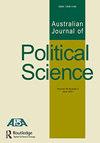强制投票和右翼民粹主义:动员、代表权和社会经济不平等
IF 1.3
3区 社会学
Q3 POLITICAL SCIENCE
引用次数: 4
摘要
当所有公民都投票时,激进政党的影响力就会下降。尽管这在过去是强制投票的主要理由,但在当代的辩论中却没有出现。我研究了与当今激进右翼民粹主义政党有关的“温和论点”的规范和经验前提,并提出,在某些条件下,强制投票可以限制这些政党的吸引力。首先,它用更普遍的动员取代了对不满选民的过度动员。其次,它解决了代表性不足的问题,提供了一种比民粹主义更多元化的代表性。第三,它通过强制投票对政策制定产生的平等主义效应,扭转了推动民粹主义支持的社会经济不平等。我的中心论点是:因为强制投票体现了包容主义、多元主义和平等主义的价值观,它解决了一些推动右翼民粹主义政党获得支持的不满情绪,而不会带来与民粹主义相同的规范成本。本文章由计算机程序翻译,如有差异,请以英文原文为准。
Compulsory voting and right-wing populism: mobilisation, representation and socioeconomic inequalities
ABSTRACT When all citizens vote, the influence of radical parties decreases. Despite this being a central justification for compulsory voting in the past, it has been absent from contemporary debates. I examine the normative and empirical premises of the ‘moderation thesis’ in relation to radical right-wing populist parties today and suggest that, under certain conditions, compulsory voting can limit these parties’ appeal. First, it replaces the excessive mobilisation of discontented voters with a more universal mobilisation. Second, it addresses the problem of underrepresentation offering a more pluralist type of representation than the populist one. And third, it reverses socioeconomic inequalities that drive support for populism through the egalitarian effects that compulsory voting has on policymaking. My central thesis is this: because compulsory voting embodies inclusivist, pluralist and egalitarian values, it addresses some of the grievances that drive support for right-wing populist parties without carrying the same normative costs as populism.
求助全文
通过发布文献求助,成功后即可免费获取论文全文。
去求助
来源期刊

Australian Journal of Political Science
POLITICAL SCIENCE-
CiteScore
2.10
自引率
8.30%
发文量
25
期刊介绍:
The Australian Journal of Political Science is the official journal of the Australian Political Studies Association. The editorial team of the Journal includes a range of Australian and overseas specialists covering the major subdisciplines of political science. We publish articles of high quality at the cutting edge of the discipline, characterised by conceptual clarity, methodological rigour, substantive interest, theoretical coherence, broad appeal, originality and insight.
 求助内容:
求助内容: 应助结果提醒方式:
应助结果提醒方式:


